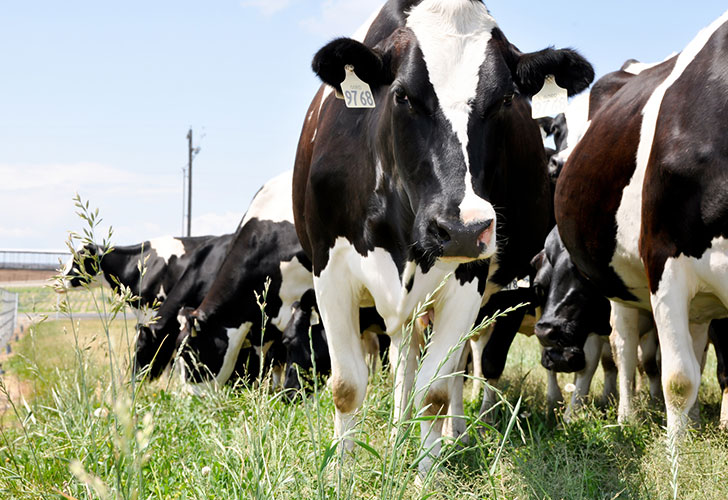What Does "Free-Range" Really Mean? 10 Common Food Buzzwords Demystified
You've seen them before — "grass-fed," "cage-free," and "sustainably raised" labels on your milk, eggs, and meats. But what the heck do they really mean? We'll stop your head from spinning and give you the lowdown on the common food terms and some other surprising information about US farming practices, below.
Sustainable
While the USDA itself has a hard time nailing down a definition of this practice, being deemed "sustainable" is loosely translated to mean: humane farming practices that are friendly to the livestock, consider the health impact on the people they feed, and take into account the impact on the environment.
More than being grown without pesticides, sustainable practices considers the broader impacts farming has on the earth and explores new ways to improve our environment. For example, cows are the ultimate recyclers and can turn human food products into fuel that powers everything from homes to the farms they're raised on.
Grass-Fed
Simply put, this label means that cows were given an all-grass diet and allowed to forage for their own food. You'll recognize these cows leisurely grazing on the hillsides and living the good life in their natural environment. You may say that happy cows make better milk, but did you know that cows can make more than just milk? Washington dairy cows also help create fertilizer for award-winning vineyards. Talk about a new take on happy hour!
Local
There's some debate about the definition of what "local" really means, and it really depends on your retailer or farmer. Some define "local" as 100 miles from farm to table, whereas others define it as up to 400 miles. Nonetheless, the local movement not only promotes the consumption of foods that are native to your area (and commonly identified as being grown organically), but also supports local farmers in your community.
The farming community has been known to give more than the fresh foods you find at your farmers market, too. Dairy farmers in Washington partner with food banks in the state to provide foods to families in need, further promoting the community aspect of the local food movement.
Free-Range
Though the USDA only currently regulates poultry, "free range" would mean that livestock would have access to the outdoors, or in the case of eggs, would have been produced by birds in their natural environment. Similarly, Washington dairy farms have moved to free-stall housing arrangements that allow cows to choose their preferred place to eat, drink, and rest.
rBST-Free
Recombinant bovine somatotropin is a natural hormone produced by cows, and some US farms supplement with additional rBST in order to increase milk production. While the FDA has determined that this practice is not harmful for human consumptions, there are farmers that reject this practice, like Washington Dairy farmers, for example.
Organic
When food is labeled as organic, it means that it is free of synthetic additives, like pesticides, synthetic fertilizers, or genetically modified organisms (GMOs). Food labeled USDA Organic or Certified Organic requires that 95 percent of the ingredients are organic.
Nitrate-Free
You'll often find this label on packaged meats, but it can be a bit deceiving. All meats are cured with salt, but nitrate-free means the item has been processed with a natural nitrate instead of synthetic sodium nitrate.
Non-GMO
This stands for nongenetically modified food, which, in essence, means food that wasn't created in a laboratory using engineering techniques. This is a very hot food issue right now, as people are concerned that manipulated food alters human DNA, and that can come with a host of health and environmental concerns on its own.
Cage-Free
This term is pretty much what it sounds like — eggs that are labeled "cage-free" are produced by hens that aren't restricted to a cage, but are housed within a barn and may or may not have access to the outside.
Hormone-Free
Hormones are not allowed in the raising of pork or poultry but can be used when raising cows. Federal regulations do require the use of the following statement on all hormone-free products, so keep an eye out on your packaging for: "No hormones added. Federal regulations prohibit the use of hormones." In the case of cows, farmers can use the term "no hormones administered" if given clearance due to sufficient documentation proving that they haven't administered hormones.
More From Dairy Farmers of Washington

Washington dairy cows are a key ingredient in our state's sustainable future. They're the ultimate recyclers, turning inedible human food waste into a valuable resource that powers our homes, fuels our farms, and fertilizes Washington's top crops. To learn more, visit WADairy.com.